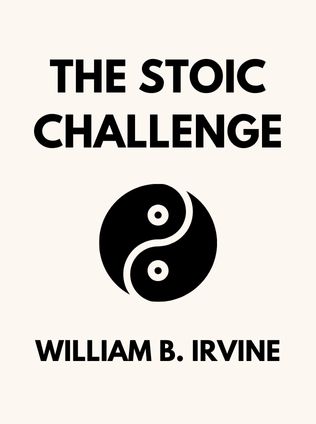
The Stoic Challenge
A Philosopher's Guide to Becoming Tougher, Calmer, and More Resilient
By William B. Irvine
Published 01/2019
About the Author
William B. Irvine is a professor emeritus of philosophy at Wright State University, where he has dedicated his academic career to making the wisdom of ancient philosophies accessible and applicable to the modern world. Irvine’s scholarly work spans various areas of philosophy, but he is particularly known for his writings on Stoicism—a philosophy that originated in ancient Greece and Rome. His ability to distill complex philosophical ideas into practical advice for contemporary readers has made him a respected voice in the field of practical philosophy.
Beyond his academic work, Irvine is a prolific author whose books have reached a wide audience. His works, such as "A Guide to the Good Life: The Ancient Art of Stoic Joy" and "The Stoic Challenge: A Philosopher's Guide to Becoming Tougher, Calmer, and More Resilient," reflect his commitment to helping people live better lives by applying ancient wisdom to modern challenges. Irvine’s writing is characterized by its clarity, practicality, and a deep understanding of human nature, making ancient Stoic teachings relevant and actionable for today’s readers.
Main Idea
"The Stoic Challenge" is centered around the idea that life is filled with adversity, but instead of suffering through it, we can use these challenges as opportunities to strengthen our character and live a more fulfilled life. Drawing from the ancient Stoic philosophers—such as Marcus Aurelius, Epictetus, and Seneca—Irvine presents a modern interpretation of Stoicism that is grounded in the idea that we cannot control what happens to us, but we can control how we respond to it. This perspective shifts our focus from the external events that we cannot change to our internal responses, which are entirely within our control.
By adopting the Stoic mindset, Irvine argues, we can approach life’s difficulties not as setbacks, but as tests of our resilience and opportunities for personal growth. The book provides practical strategies for reframing challenges, managing our emotions, and cultivating a sense of inner peace, even in the face of adversity. Through these teachings, "The Stoic Challenge" encourages readers to embrace life’s hardships with courage, resolve, and a sense of purpose.
Table of Contents
- Introduction: The Stoic Path to a Good Life
- Chapter 1: Understanding Stoicism – A Brief Overview
- Chapter 2: The Nature of Adversity – Why Challenges Define Our Lives
- Chapter 3: The Default Response – Why We Struggle with Adversity
- Chapter 4: The Stoic Reframing Strategy – Turning Obstacles into Opportunities
- Chapter 5: Practicing Stoicism – Preparing for Life’s Challenges
- Chapter 6: Embracing Failure – Learning from Our Mistakes
- Chapter 7: Facing Life’s Greatest Challenges – Loss, Fortune, and Death
- Conclusion: Living the Stoic Life – A New Perspective on Adversity
Introduction: The Stoic Path to a Good Life
In the introduction, Irvine establishes the relevance of Stoicism in contemporary life. He argues that, despite the vast differences between the ancient world and today’s society, the core human challenges remain the same—dealing with adversity, maintaining mental tranquility, and seeking a meaningful life. According to Irvine, Stoicism offers timeless wisdom for these challenges by teaching us how to focus on what we can control and accept what we cannot.
The introduction also introduces the concept of the "Stoic Challenge," which involves viewing life’s difficulties not as sources of suffering, but as opportunities to practice Stoic virtues such as resilience, courage, and wisdom. Irvine sets the stage for the rest of the book by explaining how the Stoic approach can help us lead better, more fulfilled lives, even in the face of significant challenges.
Chapter 1: Understanding Stoicism – A Brief Overview
This chapter provides a concise overview of Stoicism, one of the most influential philosophical schools of the ancient world. Stoicism, which originated in Greece and flourished in Rome, is a philosophy that emphasizes rationality, self-control, and the importance of focusing on what is within our power. The Stoics believed that while we cannot control the external events that happen to us, we can control our reactions to them. This core principle—focusing on what we can control—forms the foundation of Stoic thought and is central to Irvine’s approach to dealing with adversity.
Sign up for FREE and get access to 1,400+ books summaries.
You May Also Like
The Subtle Art of Not Giving a F*ck
A Counterintuitive Approach to Living a Good Life
By Mark MansonRich Dad Poor Dad
What the Rich Teach Their Kids About Money - That the Poor and Middle Class Do Not!
By Robert T. KiyosakiHow To Win Friends and Influence People
The All-Time Classic Manual Of People Skills
By Dale Carnegie



















